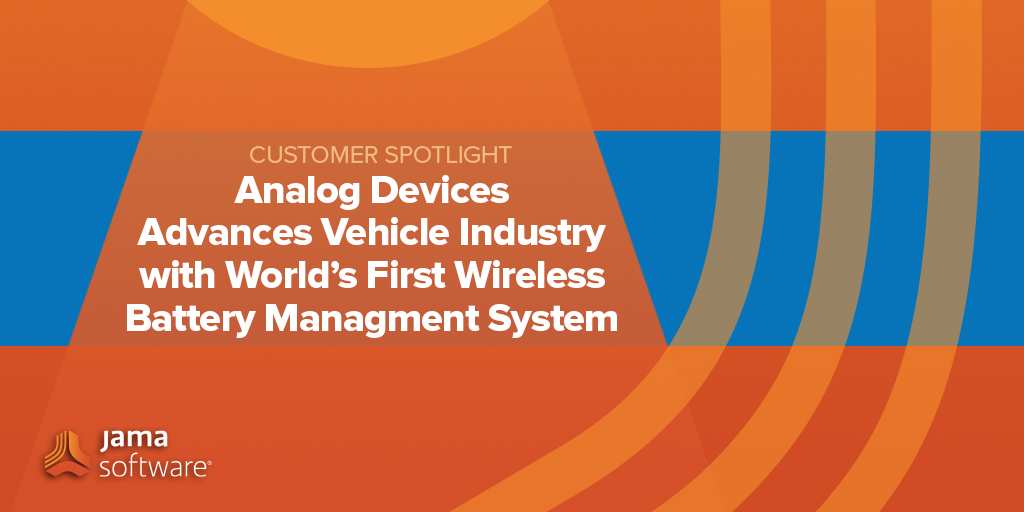Editors Note: 2020 is a year we’ll never forget. But amidst a sea of setbacks, companies across the globe continue to rise to the challenge and push forward with innovative product development. Teams who have the right tools and processes in place especially across distributed teams are able to improve collaboration and speed the time it takes to deliver new, innovative products.
In our spotlight series, we highlight companies who are doing extraordinary things in the product development space, and showcase the ways that their innovations are changing the world as we know it. In this post, we applaud the work that Analog Devices is doing to move the electric vehicle industry forward, reducing the environmental impact of commuters worldwide.
This post originally appeared as a press release on Analog Device’s website, www.analog.com.
Analog Devices Introduces Automotive Industry’s First Wireless Battery Management System for Electric Vehicles
Analog Devices, Inc. (Nasdaq: ADI) today announced the industry’s first wireless battery management system (wBMS), which enables automotive manufacturers increased flexibility to scale their electric vehicle fleets into volume production across a wide range of vehicle classes. This is the first wireless battery management system available for production electric vehicles, and it will debut on General Motors’ production vehicles powered by Ultium batteries.
The implementation of ADI’s wBMS eliminates the traditional wired harness, saving up to 90% of the wiring and up to 15% of the volume in the battery pack, as well as improving design flexibility and manufacturability, without compromising range and accuracy over the life of the battery.
ADI’s wBMS includes all integrated circuits, hardware and software for power, battery management, RF communication, and system functions in a single system-level product that supports ASIL-D safety and module-level security building upon ADI’s proven industry leading BMS battery cell measurement technology. By delivering high accuracy for the lifetime of the vehicle, the system enables maximum energy use per cell required for best vehicle range and supports safe and sustainable zero-cobalt battery chemistries, such as lithium iron phosphate (LFP).
RELATED: The Top 5 Challenges in Automotive Product Development
“The transition of battery packs from wired to wireless connectivity enables automotive manufacturers to scale their electric vehicle platforms across multiple vehicle models to meet growing consumer demand,” said Patrick Morgan, Vice President, Automotive at Analog Devices. “Our wBMS solution not only simplifies manufacturing, but also allows new systems to be built on wireless data, accelerating the entire industry towards a sustainable future. We are honored to bring this breakthrough system innovation to market with General Motors.”
Additional system features enable batteries to measure and report their own performance, increasing early failure detection, and enabling optimized battery pack assembly. The data can be monitored remotely throughout the battery lifecycle – from assembly to warehouse and transport through installation, maintenance and into a second-life phase.
RELATED: Your Guide to Selecting the Right Automotive Development Platform
ADI and General Motors recently announced a collaboration, bringing the wBMS technology to General Motors’ Ultium battery platform. The ADI technology helps ensure scalability of the Ultium platform across General Motor’s future lineup, which will encompass different brands and vehicle segments, from work trucks to performance vehicles.
“We are pleased to collaborate with ADI to take the wBMS technology to production as part of our ground-breaking Ultium battery platform,” said Kent Helfrich, Executive Director, Global Electrification and Battery Systems at General Motors. “ADI’s wBMS technology enables the more widespread electrification of our fleet, and we look forward to a continued collaboration with ADI to deliver innovation in safety, quality, and performance for the future.”
To learn more about how Jama Connect for Automotive can help your team simplify compliance, streamline development, and speed time to market, download our solution overview.
- Tackling Industrial Manufacturing’s Biggest Challenges: Solutions That Work - October 24, 2024
- How to Overcome Development Challenges: Collaboration & Alignment in Complex Product, Systems, and Software Development - August 13, 2024
- How to Overcome Development Challenges: Proving Regulatory Compliance in Complex Product and Systems Development - July 24, 2024
